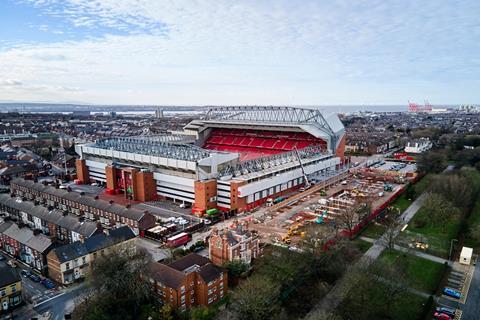But club unable to give date of when work will finish
Liverpool has said it will now run the job to finish its delayed Anfield Road stand itself after main contractor on the scheme Buckingham sank into administration earlier this week.
The club’s move to take control of the site had been widely expected with the scheme due for completion soon and several established stadia builders privately ruling themselves out of finishing off the work.
One told Building this week: ““I think the best way Liverpool finish that is if they CM it and manage it themselves,” one source said. “We don’t want to take on someone else’s work. It’s always very bitty.”
In a statement yesterday afternoon (Thursday), the club said: “We have now taken control of the Anfield Road Stand construction site and have appointed Rayner Rowen Construction, along with a number of other contractors, to resume the final works on the project.”

Rayner Rowen is a Preston-based firm which was set up in November 2016. According to Companies House, the company has not disclosed a turnover as it has only ever filed unaudited abridged accounts.
According to its website, the firm says its “wealth of experience has given us numerous opportunities of working within some of the country’s, and world’s, leading sports clubs”. This includes a new stand for London rugby union club Saracens which it completed in 2021.
In the update, Liverpool was unable to give a date when it would finish the 7,000 seat scheme. It said the upper tier of the stand would remain closed up to and including its Europa League game against Belgian club Union SG on 5 October.
It added that extra capacity would be “incrementally phased in after the next three home games” with these concluding with the 5 October match.
That could mean capacity for its next home game, the Merseyside derby against Everton on 21 October, could be lifted before more home games on 26 and 29 October. Its next home game after that is on 11 November.
The club said: “Working with Rayner Rowen Construction, we will seek to engage as many of Buckingham’s existing sub-contractors going forward as we are reasonably able to.
“Everyone at LFC is looking forward to getting the stand completed and fully open, and we are doing everything possible to make sure that happens as quickly and safely as possible.”
Nearly 450 Buckingham staff were shown the door on Monday with the appointment of administrator Grant Thornton after a planned fire sale of the firm’s divisions only saw Kier pick up the 180-strong rail business for close to £10m.
Efforts to rescue other parts, including its building, civils and sport and leisure arms, hit the buffers with close to 500 staff, including 45 at head office kept on to help with the Kier deal, made redundant.
Building understands the damages Buckingham was racking up on two stadium jobs, believed to be the Liverpool job and a new stand for Fulham, were running into millions of pounds after both schemes were delayed.
The job at Fulham was meant to have been ready in time for the start of the 2021/22 season but last month the Cottagers admitted fit-out work on bars and restaurants at the stand would not be completed until next year.
Buckingham has also been working on structural repairs to the lower tiers of Birmingham City’s St Andrew’s ground on the Kop and Tilton Road stands, which were due to get the green light before the end of 2023. St Andrew’s has been operating at a reduced capacity of around 21,000, compared to 29,400 previously.
The Tilton stand had a September reopening target, while the Kop was expected to be completed by mid November. In a statement last month, the Blues said: “As soon as we have more information we will share it.”
In its last set of accounts, for the year to December 2021, Buckingham’s turnover went up 14% to £665m but the firm racked up a £10.7m pre-tax loss with the company blaming a bust subcontractor and a client that kept changing its mind on a stadium contract, widely believed to be its scheme at Fulham’s ground, sending it to only its second annual pre-tax loss since being set up. The firm had been predicting income this year of around £700m.




























No comments yet